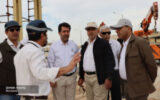
The CEO of the National Iranian Gas Company said: "The amount of gas delivered to power plants in November and the early days of December was much higher than the agreed plan."

The CEO of Isfahan Oil Refining Company announced the implementation of the flare gas recovery project with a budget of more than 6.8 million euros and 520 billion rials, saying: This project has achieved 85% physical progress so far and will be operational by the end of 1404.

The CEO of the National Iranian Oil Refining and Distribution Company announced the delivery of 391 million liters of low-sulfur furnace oil to four thermal power plants by the end of November.

While this fall has been marked by unprecedented rainfall and reduced hydroelectric power plant reserves in many northern provinces, estimates indicate a 4 to 6 degree drop in temperature starting next week; a situation that could be a warning for the gas network.

A new gas field called Toos has been discovered 40 kilometers from the Khangiran gas field.

According to data from the Statistical Center of Iran, the imbalance in energy carriers is clearly visible.

Navid Hedayatifar, referring to the gas imbalance crisis in winter, said that replacing 20 million worn-out heaters with high-efficiency heaters could reduce household consumption and allocate the released gas to industries.

Natural gas consumption in the residential, commercial, and small industrial sectors reached about 2 billion 726 million cubic meters last week as air temperatures dropped, and the highest consumption was recorded on Wednesday with about 401 million cubic meters.

The CEO of the Central Iranian Oil Company announced: "In the first half of this year, the company was able to successfully implement its commitments in the field of gas production and gas storage in the Shurijeh and Sarajeh reservoirs."

The Director of Coordination and Supervision of Production at the National Iranian Gas Company announced that with the successful completion of major repairs to refineries and more gas storage than last year, a daily injection capacity of 850 to 860 million cubic meters of gas has been provided to the national network, and a stable supply of winter fuel for the country has been guaranteed.










